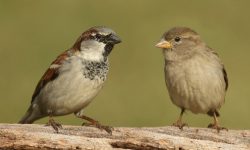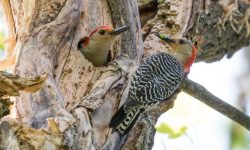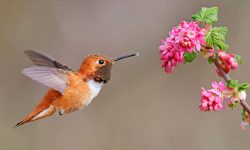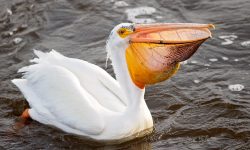Herons are fascinating creatures, renowned for their graceful movements and sharp hunting skills. These wading birds are a common sight in wetlands, lakes, and rivers around the world, with their elegant posture and striking appearance captivating birdwatchers and nature enthusiasts alike. But while herons are most commonly associated with fish, frogs, and insects, a popular question often arises: Do herons eat ducks? In this article, we’ll explore the feeding habits of herons, investigate whether they prey on ducks, and provide insights into their overall diet.
Herons are skilled hunters with a diverse range of prey, but are ducks a part of that menu? Let’s dive into the details of heron diets, their hunting behaviors, and the chances that these birds will go after a duck.
The Heron’s Diet: What Do They Eat?
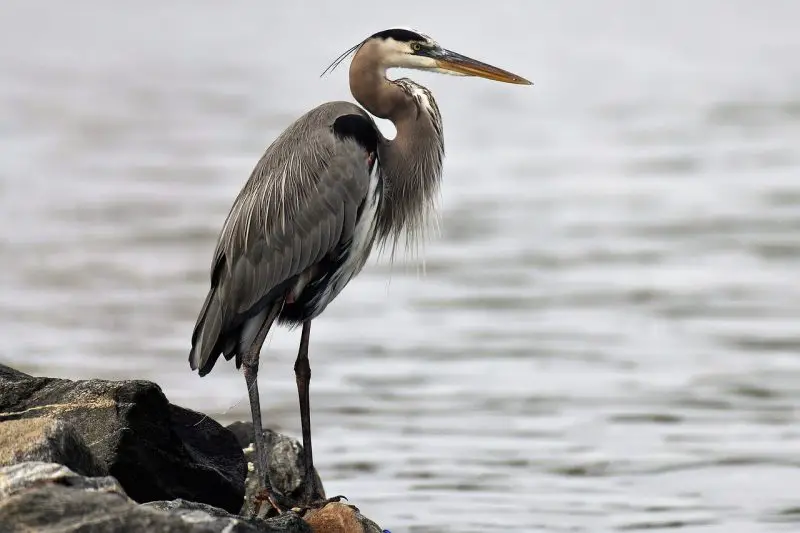
Herons are opportunistic predators, which means their diet depends largely on the availability of prey in their environment. They are carnivorous birds and primarily hunt for live food, making them excellent hunters and foragers. The specific composition of their diet varies depending on the species of heron, its habitat, and seasonal changes.
Common Prey of Herons
Herons are skilled at hunting a variety of prey, often relying on their keen eyesight and stealthy approach to capture their meals. Here are some of the most common types of prey that herons target:
1. Fish
Fish are undoubtedly the most common and most important part of a heron’s diet. Herons typically hunt in shallow waters, standing motionless or wading through the water to catch fish. Some herons even dive beneath the surface to catch their prey. Fish like minnows, perch, bass, and carp are often on the menu, though herons will hunt whatever species is abundant in their environment.
2. Amphibians
Amphibians, such as frogs, salamanders, and tadpoles, make up a significant portion of a heron’s diet. These creatures are often found in the same habitats as herons and are relatively easy for these birds to catch. Frogs, in particular, are a favorite food for herons due to their abundance and ease of capture.
3. Invertebrates
Herons also hunt smaller invertebrates like insects, crustaceans, and mollusks. These creatures are particularly common in wetland habitats, where herons frequently hunt. Herons will often hunt these smaller prey when fish and amphibians are less abundant.
4. Small Mammals
While herons are not known to target large mammals, they may occasionally hunt small mammals, such as voles or rodents. These animals are typically caught while the heron is hunting in shallow waters or along the edges of wetlands.
5. Reptiles
In some regions, herons have been known to hunt reptiles like snakes and lizards. These prey items are particularly common in warm climates and wetlands where reptiles are abundant.
Do Herons Hunt and Eat Ducks?
Now that we know what herons typically eat, let’s address the burning question: Do herons eat ducks? The answer is somewhat complex, as it depends on various factors such as the size of the heron, the size of the duck, and the circumstances under which the heron encounters the duck.
Herons and Juvenile Ducks
Herons are opportunistic predators, which means they will take advantage of any easy meal available. While herons generally do not hunt fully grown ducks, they may target juvenile or small ducks. Ducklings are particularly vulnerable due to their smaller size, and herons, with their long, sharp bills, can easily strike and catch these young birds. Juvenile ducks may also be slower and less aware of predators than adult ducks, making them easier targets for a hungry heron.
Adult Ducks: Too Large for Herons
While juvenile ducks may be within the heron’s hunting range, adult ducks are typically too large for most heron species to catch and consume. Ducks are generally much faster than herons in flight, and adult ducks are well-equipped to escape predators. Herons, even with their impressive hunting skills, would have a difficult time capturing an adult duck, especially when the duck is in flight or swimming in the water.
Herons and Duck Eggs
Although herons are less likely to target adult ducks, there is evidence to suggest that they will raid duck nests and consume duck eggs. Herons are known to be opportunistic foragers, and if they come across a nest with eggs, they may not hesitate to steal them. This behavior is particularly common in wetlands where herons and ducks coexist. The eggs of ducks provide a rich source of nutrients, and herons will take advantage of this food source when available.
The Heron’s Hunting Technique: How Do They Catch Their Prey?
Herons are well-known for their hunting prowess, and their method of capturing prey is both efficient and effective. They use a combination of patience, stealth, and precision to catch their food. Here’s a closer look at how herons hunt and capture their prey:
Stealthy Stalking
One of the primary hunting techniques employed by herons is stalking. These birds are patient hunters and will often stand motionless in the water or along the shoreline for long periods of time. This stillness allows them to carefully observe their surroundings and spot potential prey. When they spot something, they will slowly move toward it, often without disturbing the water or the environment around them.
The Strike
Once a heron is close enough to its prey, it will strike with incredible speed and precision. The heron’s long, sharp bill acts like a spear, allowing it to quickly pierce the prey and secure it. This rapid strike is one of the heron’s most effective hunting tools and allows it to catch fish, amphibians, and even small mammals or birds.
Fishing and Wading
Herons are particularly adept at hunting in shallow waters, where fish and amphibians are abundant. They will often wade through the water, using their sharp bill to probe the mud and catch prey. Some species of herons, such as the great blue heron, may even use their feet to stir the water and dislodge prey from the bottom.
Soaring and Hunting from the Air
Although herons are primarily ground hunters, they are also capable of hunting from the air. Herons often soar at great heights, using their keen eyesight to spot potential prey from above. This hunting technique is most common when herons are searching for fish in open bodies of water or hunting in areas where prey is widely dispersed.
Herons in Urban Areas: Are They a Threat to Ducks?
Herons are highly adaptable birds and have been increasingly found in urban and suburban environments. Wetland areas, parks, and even golf courses provide prime hunting grounds for these birds. In urban areas, herons may encounter domestic ducks or waterfowl that are not as adept at evading predators as their wild counterparts.
Herons in Urban Parks
In urban parks and wetlands, herons may be more likely to encounter ducks, particularly if the area is home to a large population of waterfowl. While herons generally do not target adult ducks, they may prey on ducklings or raid nests for eggs. Additionally, ducks in urban areas may not be as wary of predators as wild ducks, making them more vulnerable to heron attacks.
Domestic Ducks and Herons
In areas where people keep domestic ducks, herons may be attracted to ponds or lakes where these ducks reside. Although adult domestic ducks are typically too large for herons to prey on, the heron may still be interested in the ducklings or eggs. This can be a concern for people who keep waterfowl in areas where herons are present.
Conclusion: Do Herons Eat Ducks?
In summary, while herons do not typically hunt adult ducks, they are opportunistic predators and may target juvenile ducks or ducklings when they are vulnerable. Herons are highly skilled hunters, and if given the chance, they may also raid duck nests for eggs. However, ducks, particularly adult ones, are generally too large and fast for herons to capture and eat. While ducks are not a primary food source for herons, they are still a potential prey item, especially in cases where other food sources are scarce.
Herons play a crucial role in their ecosystems by controlling populations of small mammals, amphibians, and fish. They are highly adaptable birds that can thrive in a variety of environments, from wetlands to urban areas. By understanding the behavior and diet of these fascinating birds, we can appreciate their role in nature and ensure that their habitats remain protected for future generations.
Whether you’re a birdwatcher, nature enthusiast, or simply curious about these majestic predators, it’s clear that herons are captivating creatures with an intriguing diet. So, the next time you spot a heron by a pond or river, you’ll have a deeper understanding of what this remarkable bird might be hunting—and whether a duck is on the menu.

